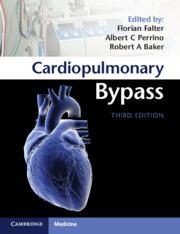Book contents
- Cardiopulmonary Bypass
- Cardiopulmonary Bypass
- Copyright page
- Contents
- Contributors
- Foreword
- Chapter 1 Human Factors and Teamwork in Cardiac Surgery
- Chapter 2 Equipment for Cardiopulmonary Bypass
- Chapter 3 Monitoring during Cardiopulmonary Bypass
- Chapter 4 Cardiopulmonary Bypass Circuit Setup and Safety Checks
- Chapter 5 Priming Solutions for Cardiopulmonary Bypass Circuits
- Chapter 6 Anticoagulation for Cardiopulmonary Bypass
- Chapter 7 Conduct of Cardiopulmonary Bypass
- Chapter 8 Minimal Invasive Extracorporeal Circulation
- Chapter 9 Considerations for Operations Involving Deep Hypothermic Circulatory Arrest
- Chapter 10 Metabolic Management during Cardiopulmonary Bypass
- Chapter 11 Myocardial Preservation during Cardiopulmonary Bypass
- Chapter 12 Weaning from Cardiopulmonary Bypass
- Chapter 13 Intraoperative Mechanical Circulatory Support and Other Uses of Cardiopulmonary Bypass
- Chapter 14 Mechanical Circulatory Support
- Chapter 15 Cardiopulmonary Bypass for Pediatric Cardiac Surgery
- Chapter 16 Coagulopathy and Hematological Disorders Associated with Cardiopulmonary Bypass
- Chapter 17 Inflammation and Organ Damage during Cardiopulmonary Bypass
- Chapter 18 Neuromonitoring and Cerebral Morbidity Associated with Cardiopulmonary Bypass
- Chapter 19 Renal Morbidity Associated with Cardiopulmonary Bypass
- Chapter 20 Common and Uncommon Disasters during Cardiopulmonary Bypass
- Index
- References
Chapter 12 - Weaning from Cardiopulmonary Bypass
Published online by Cambridge University Press: 24 October 2022
- Cardiopulmonary Bypass
- Cardiopulmonary Bypass
- Copyright page
- Contents
- Contributors
- Foreword
- Chapter 1 Human Factors and Teamwork in Cardiac Surgery
- Chapter 2 Equipment for Cardiopulmonary Bypass
- Chapter 3 Monitoring during Cardiopulmonary Bypass
- Chapter 4 Cardiopulmonary Bypass Circuit Setup and Safety Checks
- Chapter 5 Priming Solutions for Cardiopulmonary Bypass Circuits
- Chapter 6 Anticoagulation for Cardiopulmonary Bypass
- Chapter 7 Conduct of Cardiopulmonary Bypass
- Chapter 8 Minimal Invasive Extracorporeal Circulation
- Chapter 9 Considerations for Operations Involving Deep Hypothermic Circulatory Arrest
- Chapter 10 Metabolic Management during Cardiopulmonary Bypass
- Chapter 11 Myocardial Preservation during Cardiopulmonary Bypass
- Chapter 12 Weaning from Cardiopulmonary Bypass
- Chapter 13 Intraoperative Mechanical Circulatory Support and Other Uses of Cardiopulmonary Bypass
- Chapter 14 Mechanical Circulatory Support
- Chapter 15 Cardiopulmonary Bypass for Pediatric Cardiac Surgery
- Chapter 16 Coagulopathy and Hematological Disorders Associated with Cardiopulmonary Bypass
- Chapter 17 Inflammation and Organ Damage during Cardiopulmonary Bypass
- Chapter 18 Neuromonitoring and Cerebral Morbidity Associated with Cardiopulmonary Bypass
- Chapter 19 Renal Morbidity Associated with Cardiopulmonary Bypass
- Chapter 20 Common and Uncommon Disasters during Cardiopulmonary Bypass
- Index
- References
Summary
The transition from cardiopulmonary bypass (CPB) to normal circulation requires numerous mechanical, physiological and pharmacological factors to be coordinated efficiently within a short period of time. Weaning from CPB is often a routine process, however preexisting poor cardiac function or difficulties during the operation may make it complex and challenging. Complications encountered during the weaning phase may contribute to significant additional perioperative morbidity.
Keywords
- Type
- Chapter
- Information
- Cardiopulmonary Bypass , pp. 112 - 122Publisher: Cambridge University PressPrint publication year: 2022



